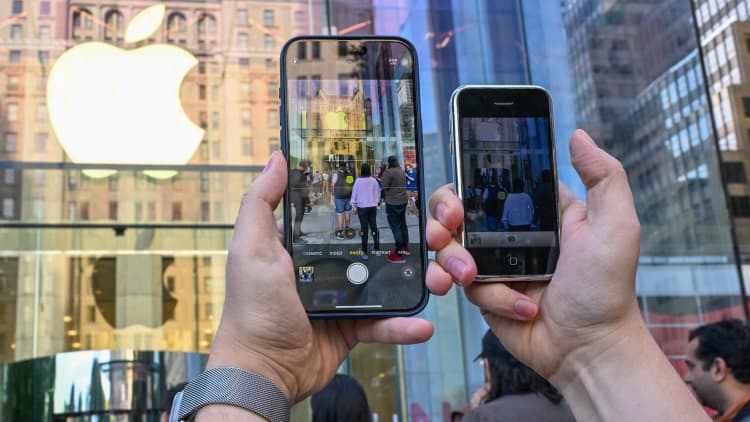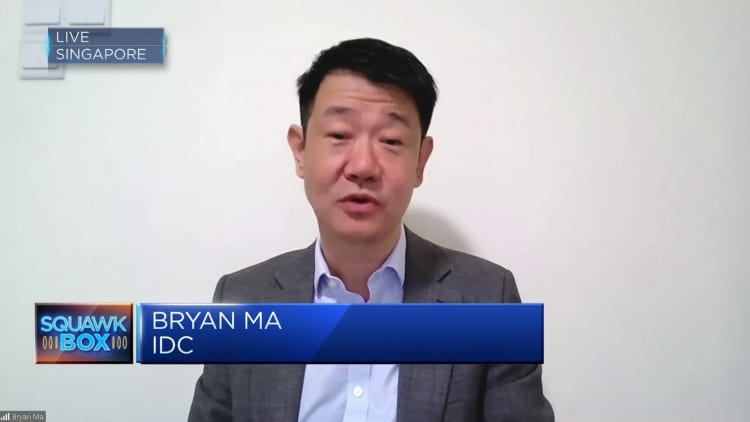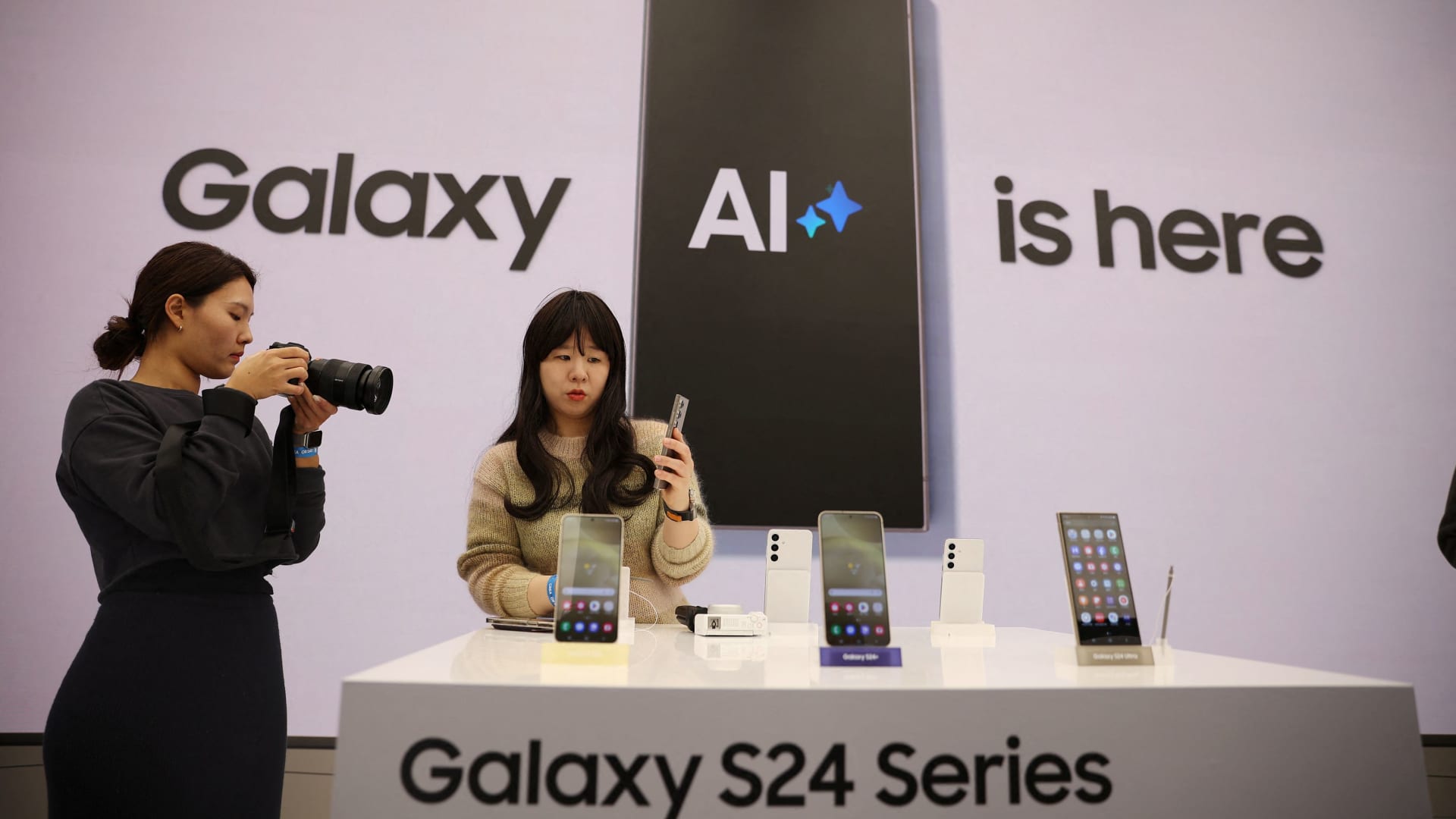Samsung Electronics’ flagship Galaxy S24 series smartphones are shown during a launch event in Seoul, South Korea, January 15, 2024.
Kim Hong-ji | Reuters
BARCELONA – Smartphone makers are talking a big game about artificial intelligence this year.Â
And they’re so confident in the features they’re cramming into their phones that they believe it will set off a new “supercycle” for the industry.Â
Samsung, Googleand Chinese firm Honor are among the names that are infusing their latest phones with AI-powered features for translating and summarizing conversations and taking and editing photos with the power of generative AI algorithms.
These are algorithms that are built into the chips of the devices themselves, rather than being accessed through the cloud.Â
Samsung went big on generative AI with its Galaxy S24 Ultra smartphone
Google has also integrated AI directly into its latest Pixel phones
Meanwhile, Apple is reportedly exploring adding device AI features to the next iPhone, according to Financial Times.Ya
All of this comes as Mobile World Congress, the biggest mobile technology industry trade show of the year, gets under way.
Major device makers like Samsung, Huawei, Honor and Oppo, plus chip companies like Qualcomm and MediaTek are expected to talk big about how much AI is transforming our personal devices.
When was the last smartphone supercycle?
Smartphone makers have dreamed of an AI-driven “supercycle” in their industry after a rough few years in which device sales have slowed aggressively.Â
In 2023, smartphone sales fell to 1.16 billion units, the lowest point for unit shipments in a decade.Â
The last “supercycle” in smartphones occurred between 2010 and 2015, when in five years the market grew fivefold from roughly 300 million units sold annually to 1.5 billion units, according to IDC data.Â
This happened at a time when smartphones were just starting to become mainstream thanks to the emergence of widely used apps: Facebook, Instagram, WhatsApp, Uber, Snapchat, Twitter and Candy Crush Saga to name a few.
“The growth happened not just because Apple released the iPhone or because Google released Android,” Francisco Geronimo, vice president of data and analytics at research firm IDC, told CNBC.
“What really made it successful, this supercycle, was the fact that people were able to get the Internet in their pockets,” Geronimo said in a phone interview with CNBC.

Other things were happening at the time, including the ability to make video calls over the Internet with 3G and the transition to 4G, which meant faster speeds.
“We saw very popular operating systems, not just the browser, but a whole world of applications that brought so many services and so much content to the phone,” Geronimo said.
Ben Wood, principal analyst at CCS Insight, points to the iPhone reveal as the latest “seismic disruption” to hit the industry. Â
“Everything since then has been less disruptive,” Wood told CNBC.Â
“age of artificial intelligence phones”
Big smartphone players are betting that a supercycle is about to happen thanks to AI.Â
Samsung, which launched the Galaxy S24 Ultra earlier this year, believes there is a strong chance that artificial intelligence will usher in a new dawn that could breathe fresh life into the industry.Â
James Kitto, Samsung’s head of mobile experiences in the UK, told CNBC that the mobile industry is at the start of a new era of AI-driven hypergrowth.
“There is every expectation that this will be the case. We’re seeing really, really high demand,” Kitto told CNBC from Samsung’s European headquarters in Chertsey, England.
The Galaxy S24 comes with the ability to frame an object on your camera and bring up Google search results for it, as well as live translation of phone calls to people speaking foreign languages.
“We are now at the dawn of a whole new era, the era of AI phones,” Kitto said.
Brian Rakowski, vice president of product management for Google’s Pixel phone division, said he expects artificial intelligence to spark renewed interest in mobile technology.
Google has been working on integrating AI into its devices for years, most notably with the addition of the Tensor line of smartphone processors.
“We’ve already seen that AI is going to be the differentiator and the next wave of innovation in all technology, but especially in mobile,” Rakowski told CNBC. “It’s so key to everything in our entire computing life and computing platform.”

Google recently enabled its Tensor Processors, or TPUs, to power its Gemini nano AI system. It is a smaller version of the family of large language models that come under the general name Gemini.Â
Google expects to launch more advanced versions of Gemini for Android next year, according to Rakowski.
“We’ve made a lot of bets and we’re working really closely with the research team at [AI lab] DeepMind to make sure the Pixel is the best way to demonstrate and surface what’s coming down the pipe,” Rakowski said.
“Nobody knew the LLM would be the thing. But we expected breakthroughs in space,” he added.
Why a supercycle is unlikely
Analysts say a supercycle is unlikely to happen in the next few years because there aren’t enough new features and innovations in the market to convince people holding on to their outdated smartphones to upgrade.
Sales are expected to pick up this year, according to IDC, with smartphone shipments expected to rise 2.4% this year to 1.19 billion units in 2024. But that comes from a low base and represents a weak overall growth for the industry.
From there, growth is expected to remain stagnant in the coming years, with IDC forecasting a gradual annualized increase of between 2% and 3% from 2025 to 2028.
Consumers remain cautious about the prospect of upgrading their smartphones today as upgrade prices are still high. Â
Also, much of the latest models coming out still tout only incremental improvements to what came before.
“As much as the potential of AI on smartphones is an exciting prospect, I don’t believe the technology will contribute to another smartphone sales supercycle,” Wood told CNBC via email.
“At best, it will help keep sales going and add a little extra interest to smartphones at a time when hardware is becoming increasingly boring.”
Today, there isn’t enough excitement about smartphones at a broader level to justify the sales boom that many companies dream of.
That will change in the coming years, according to Geronimo, but only after artificial intelligence begins to become useful to consumers.
“If there is anything that can help [a supercycle] if it did, it would be artificial intelligence,” Geronimo said. “But with artificial intelligence, there’s this question mark about how smart the phone is going to get.”
Smartphones today “are not smart,” he added
“If you see a billboard with the latest Tarantino movie or Mission Impossible, what do you do? You have to open an app, book tickets on that app, text your wife, message where she needs to go, go into your calendar app, check when is the best day to go to a movie, etc. .”Â
Many companies are working on technology that can do just that.
For example, Humane has its own AI Pin, a compact, square-shaped device that users can speak to to ask it to perform certain tasks, such as setting reminders. To do this, it uses OpenAI’s large language models. Â
Another startup, Rabbit, has a similar device. Geely-owned Meizu, meanwhile, recently said it was moving away from making Android smartphones in favor of creating an AI-focused hardware product.
https://www.cnbc.com/2024/02/27/smartphone-makers-samsung-google-dream-of-an-ai-driven-supercycle-.html







